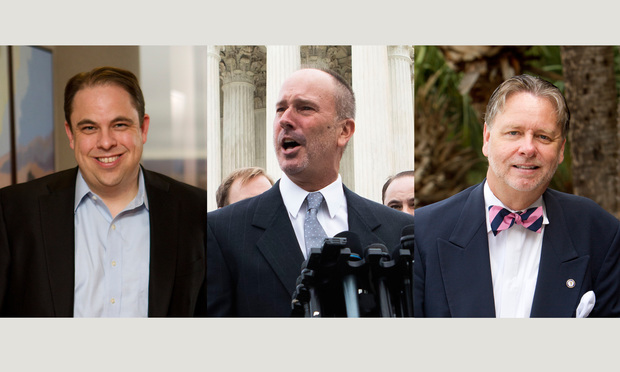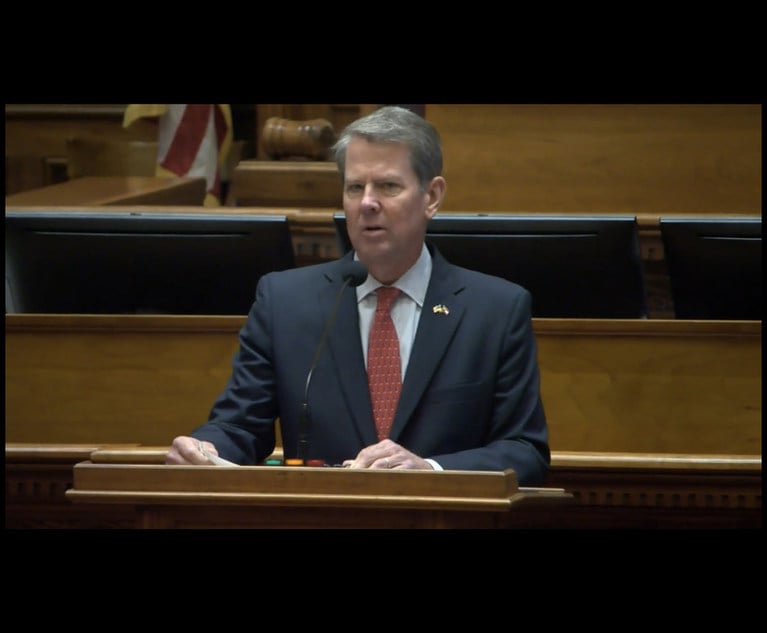Landmark SCOTUS Ruling Is Only the Beginning for Bostock's Discrimination Claims
"I think it's important to note that for Gerald, while this has been a very long journey, it is very much in the early days of his underlying case," said Thomas Mew of Buckley Beal.
June 17, 2020 at 01:52 PM
6 minute read
 Thomas "Tom" Mew (from left ), Gerald Bostock and Chief Judge Steven Teske.
Thomas "Tom" Mew (from left ), Gerald Bostock and Chief Judge Steven Teske.
For Atlanta resident Gerald Bostock, the U.S. Supreme Court's landmark ruling Monday affirming Title VII discrimination protection for the LGBTQ community is not the end of the legal fight over his 2013 firing.
Bostock's job discrimination suit against the Clayton County Commission, which he first filed pro se in 2016, was never decided on the merits.
Instead, Senior District Judge Orinda Evans granted the Clayton County Commission's motion to dismiss the case in 2017, adopting arguments that Title VII of the Civil Rights Act of 1964 did not prohibit discrimination against members of the LGBTQ community, even though it outlaws discrimination on the basis of sex.
"I think it's important to note that, for Gerald, while this has been a very long journey, it is very much in the early days of his underlying case," Bostock counsel Thomas Mew of Atlanta's Buckley Beal said Tuesday. "There has been no substantive discovery. We are basically starting close to square one on the underlying case."
Bostock was the child welfare services coordinator assigned to Clayton County Juvenile Court when he was fired for "conduct unbecoming" an employee in 2013, several months after he began playing in a gay recreational softball league. His participation in the league and his sexual orientation soon generated criticism "by one or more persons with significant influence" on county decision-making at a county meeting Bostock attended, according to Evans' dismissal ruling.
Bostock contends that criticism was the impetus for an internal audit of the Court Appointed Special Advocate, or CASA, program that he managed. Bostock and his counsel maintain that he never mismanaged funds under his control and that the audit was a pretext for firing him.
"Seven years ago, I never realized I would lose my dream job, all because I made a decision to join a gay softball league," Bostock said. "It was an easy decision to move forward and to stand up, not only for myself. I realized very early on this was such a big, important issue that impacts so many people across the country that I had to do something."
"One of the main things I learned is patience," he said. "Because of my sense of who I am and what I seek, I will continue to fight. It's my top priority. I am excited about getting the opportunity to go back to court. My stamina is gonna stay strong. … And I remain optimistic, as I have from day one."
Said Mew: "We are prepared to push forward with Gerald's claims and proceed to trial if necessary. … Obviously, we have no shortage of very able folks who will be able to lend a hand."
Clayton County Commission Chairman Jeff Turner said the county is still considering its options on how to proceed. He confirmed that Clayton County Juvenile Court Chief Judge Steve Teske, who was Bostock's supervisor and authorized his firing, will have a significant say in determining what the county does next.
He also confirmed that the commission would consider recommendations by the county's outside counsel Jack Hancock, a partner at the Atlanta offices of Freeman Mathis & Gary. Hancock declined to comment.
Clayton County Staff Attorney Charles Reed Jr. could not be reached for comment.
On Tuesday, Teske said Bostock's firing was never about his sexual orientation and was about mismanagement of court fees. Some of those funds intended to recruit CASA volunteers improperly went to the softball team, Teske said.
"All that together created some very poor optics for the court," he said. "It showed poor judgment. It created a trust issue."
The judge said that while he is "ecstatic" about the Supreme Court ruling, "The issue before the Supreme Court had nothing to do with whether or not he [Bostock] was, in fact, terminated because he was gay."
Teske said he supported Bostock's argument that Title VII should extend protections to the LGBTQ community. But he rejected Bostock's claim that his sexual orientation prompted the audit that led to his termination. Teske said he and his wife were friends with Bostock and his partner, socialized with them and introduced them to Teske's children and his parents during the decade that Bostock worked at the juvenile court. Bostock's replacement was a lesbian, Teske said.
Teske said he chose not to counter Bostock's narrative while the case was making its way to the Supreme Court.
But Teske said that, now, Bostock's narrative that he was targeted because he was gay has cast a public shadow on his own motives and beliefs, potentially jeopardizing his longtime advocacy for youth, including juveniles who are often mistreated because they are gay, lesbian or transgender.
"I am proud of Gerald for taking this issue up to the Supreme Court," he said. "Notwithstanding the fact that I don't appreciate him not telling the whole truth, … he couldn't have gotten there if he had revealed the whole truth. Because he didn't reveal the whole truth, he got there. Look what he won. A landmark decision to protect those who are gay and lesbian and transgender. That's the bigger picture here. I don't want that to get lost."
Teske said Hancock has not asked him whether the county should continue to litigate the case, but said he believes the county will continue it.
"Up until this point, I let Gerald control the narrative," Teske said. "There wasn't a need for me to interject the rest of the story because the issue was not about me at the time. It was about whether or not gays should be protected in their place of employment, which I support."
But now, he said, "The landscape has changed. … Now it's about the facts. I can't let him control that."
This content has been archived. It is available through our partners, LexisNexis® and Bloomberg Law.
To view this content, please continue to their sites.
Not a Lexis Subscriber?
Subscribe Now
Not a Bloomberg Law Subscriber?
Subscribe Now
NOT FOR REPRINT
© 2025 ALM Global, LLC, All Rights Reserved. Request academic re-use from www.copyright.com. All other uses, submit a request to [email protected]. For more information visit Asset & Logo Licensing.
You Might Like
View All
Panel to Decide if Governor Should Suspend Georgia Lawyer From Elected Post
4 minute read

Plaintiffs Attorneys Awarded $113K on $1 Judgment in Noise Ordinance Dispute
4 minute readLaw Firms Mentioned
Trending Stories
- 1Decision of the Day: Court Holds Accident with Post Driver Was 'Bizarre Occurrence,' Dismisses Action Brought Under Labor Law §240
- 2Judge Recommends Disbarment for Attorney Who Plotted to Hack Judge's Email, Phone
- 3Two Wilkinson Stekloff Associates Among Victims of DC Plane Crash
- 4Two More Victims Alleged in New Sean Combs Sex Trafficking Indictment
- 5Jackson Lewis Leaders Discuss Firm's Innovation Efforts, From Prompt-a-Thons to Gen AI Pilots
Who Got The Work
J. Brugh Lower of Gibbons has entered an appearance for industrial equipment supplier Devco Corporation in a pending trademark infringement lawsuit. The suit, accusing the defendant of selling knock-off Graco products, was filed Dec. 18 in New Jersey District Court by Rivkin Radler on behalf of Graco Inc. and Graco Minnesota. The case, assigned to U.S. District Judge Zahid N. Quraishi, is 3:24-cv-11294, Graco Inc. et al v. Devco Corporation.
Who Got The Work
Rebecca Maller-Stein and Kent A. Yalowitz of Arnold & Porter Kaye Scholer have entered their appearances for Hanaco Venture Capital and its executives, Lior Prosor and David Frankel, in a pending securities lawsuit. The action, filed on Dec. 24 in New York Southern District Court by Zell, Aron & Co. on behalf of Goldeneye Advisors, accuses the defendants of negligently and fraudulently managing the plaintiff's $1 million investment. The case, assigned to U.S. District Judge Vernon S. Broderick, is 1:24-cv-09918, Goldeneye Advisors, LLC v. Hanaco Venture Capital, Ltd. et al.
Who Got The Work
Attorneys from A&O Shearman has stepped in as defense counsel for Toronto-Dominion Bank and other defendants in a pending securities class action. The suit, filed Dec. 11 in New York Southern District Court by Bleichmar Fonti & Auld, accuses the defendants of concealing the bank's 'pervasive' deficiencies in regards to its compliance with the Bank Secrecy Act and the quality of its anti-money laundering controls. The case, assigned to U.S. District Judge Arun Subramanian, is 1:24-cv-09445, Gonzalez v. The Toronto-Dominion Bank et al.
Who Got The Work
Crown Castle International, a Pennsylvania company providing shared communications infrastructure, has turned to Luke D. Wolf of Gordon Rees Scully Mansukhani to fend off a pending breach-of-contract lawsuit. The court action, filed Nov. 25 in Michigan Eastern District Court by Hooper Hathaway PC on behalf of The Town Residences LLC, accuses Crown Castle of failing to transfer approximately $30,000 in utility payments from T-Mobile in breach of a roof-top lease and assignment agreement. The case, assigned to U.S. District Judge Susan K. Declercq, is 2:24-cv-13131, The Town Residences LLC v. T-Mobile US, Inc. et al.
Who Got The Work
Wilfred P. Coronato and Daniel M. Schwartz of McCarter & English have stepped in as defense counsel to Electrolux Home Products Inc. in a pending product liability lawsuit. The court action, filed Nov. 26 in New York Eastern District Court by Poulos Lopiccolo PC and Nagel Rice LLP on behalf of David Stern, alleges that the defendant's refrigerators’ drawers and shelving repeatedly break and fall apart within months after purchase. The case, assigned to U.S. District Judge Joan M. Azrack, is 2:24-cv-08204, Stern v. Electrolux Home Products, Inc.
Featured Firms
Law Offices of Gary Martin Hays & Associates, P.C.
(470) 294-1674
Law Offices of Mark E. Salomone
(857) 444-6468
Smith & Hassler
(713) 739-1250







